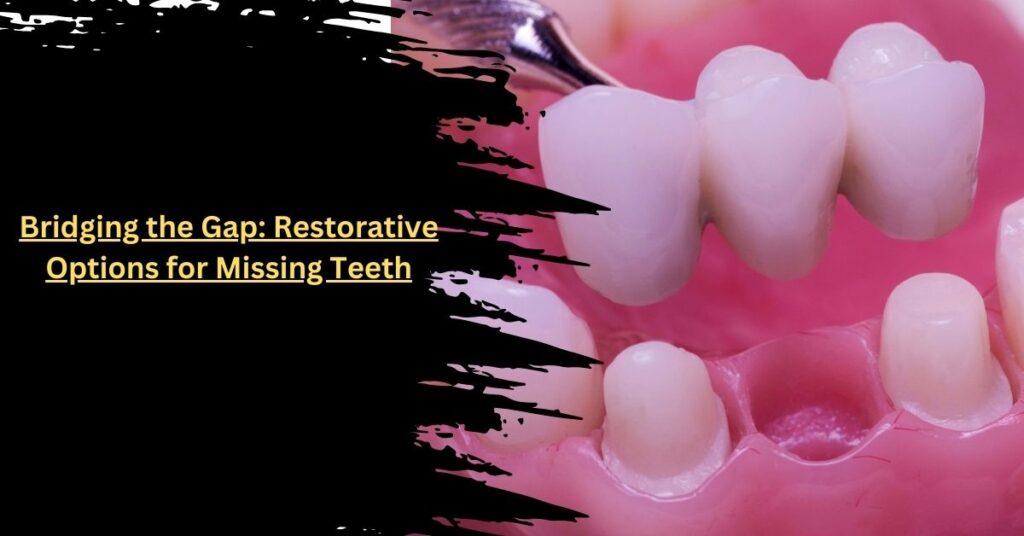Losing a tooth can be a distressing experience, impacting not only your smile but also your oral health and overall quality of life. Fortunately, modern dentistry offers several restorative options to bridge the gap left by missing teeth, each with unique benefits and considerations.
This guide explores three primary solutions: dental implants, bridges, and dentures, emphasizing their role in enhancing both functionality and aesthetics.
Dental Implants
Dental implants have revolutionized the way we approach tooth replacement. They are often considered the gold standard due to their durability and the natural look they provide. An implant involves a titanium post surgically embedded into the jawbone, which acts as a root for the replacement tooth. This process allows the bone to integrate with the implant, offering a stable and long-lasting foundation.
Benefits
Longevity and Durability: With proper care, dental implants can last a lifetime, making them a cost-effective solution in the long run.
Aesthetic Appeal: Implants are designed to look and feel like natural teeth, seamlessly blending with your smile.
Bone Health: By stimulating the jawbone, implants help prevent bone loss, maintaining facial structure and oral health.
Considerations
Surgical Procedure: Implant placement requires surgery, which may not be suitable for everyone. Patients must have healthy gums and adequate bone density.
Cost: Initially, implants can be more expensive than other options, though their longevity often offsets the cost over time.
For those considering implants and residing in Florida, exploring dental implants in Ocala FL could be a beneficial first step, as local professionals can provide personalized consultations and care.
Dental Bridges
Dental bridges are another effective option for replacing missing teeth. They are typically used when a tooth is missing between two healthy teeth. A bridge consists of one or more artificial teeth anchored by crowns on the adjacent natural teeth.
Benefits
Quick Procedure: Unlike implants, bridges do not require surgery, allowing for a faster restoration process.
Cost-Effective: Bridges are generally less expensive than implants, making them an attractive option for those on a budget.
Functional Restoration: Bridges can restore function and aesthetics, enabling patients to chew and speak more comfortably.
Considerations
Impact on Adjacent Teeth: The procedure requires altering the adjacent healthy teeth to accommodate crowns, which can compromise their integrity.
Longevity: Bridges typically last 5 to 15 years, depending on care, which is shorter compared to implants.
Dentures
For those seeking a non-invasive and versatile solution, dentures offer a viable alternative. They are removable prosthetic devices that can replace a few missing teeth (partial dentures) or an entire arch (full dentures).
Benefits
Non-Invasive: Dentures do not require surgery, making them suitable for those who may not qualify for implants or bridges.
Versatility: They can be custom-made to fit any mouth, replacing multiple teeth at once.
Affordability: Dentures are generally the most affordable option for missing teeth.
Considerations
Comfort and Fit: Dentures may require adjustment and can take time to get used to. They may also need periodic refitting as the mouth changes.
Maintenance: They must be removed and cleaned regularly to maintain oral hygiene and prevent infections.
Enhancing Oral Health and Quality of Life
Each restorative option plays a crucial role in improving oral health and enhancing quality of life. Missing teeth can lead to a host of issues, including difficulty eating, speaking challenges, and self-esteem problems. By choosing an appropriate restorative method, patients can regain their confidence and enjoy a better quality of life.
Improved oral health is another significant advantage. Each solution helps distribute bite forces evenly, preventing undue stress on remaining teeth and reducing the risk of further dental complications. Additionally, maintaining a complete set of teeth supports overall facial structure and health, contributing to a youthful appearance.
In conclusion, whether through the advanced technology of dental implants, the efficiency of bridges, or the versatility of dentures, there are effective solutions available to bridge the gap of missing teeth. Consulting with a dental professional can help determine the best option tailored to individual needs and preferences, ultimately restoring both function and confidence in one’s smile.
